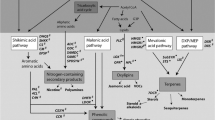Abstract
It is a triviality to state that any kind of stress will affect virtually all plant reactions, if only it is strong enough. But even mild stress of sufficient duration will induce a sequence of secondary events leading to changes in plant metabolism, structure and growth. These changes are far too complex to provide information on primary mechanisms of stress damage. A now well known phenomenon which illustrates the consequences of secondary stress damage is inhibition of the photosynthetic machinery due to exposure of plants to a combination of water stress and high light intensities. Photoinhibitory damage must not be considered as a primary water stress effect, since it is not observed at low light intensities (Powles 1984). In order to understand the manner in which photosynthetic processes are initially affected, water stress must be imposed experimentally in a well-defined manner and over a relatively short time interval. Unfortunately this means that experimental conditions will deviate considerably from what we call “natural.” Therefore, the results obtained in this way must later be critically examined to establish their relevance under field conditions. In the following chapter, methods and results are described that outline our approach to determining the possible mechanisms by which water stress initially affects photosynthesis and plant metabolism.
Access this chapter
Tax calculation will be finalised at checkout
Purchases are for personal use only
Preview
Unable to display preview. Download preview PDF.
Similar content being viewed by others
References
Berkowitz GA, Gibbs M (1983) Reduced osmotic potential effects on photosynthesis. Identification of stromal acidification as a mediating factor. Plant Physiol 71: 905–911
Flowers TJ, Troke PF, Yeo AR (1977) The mechanism of salt tolerance in halophytes. Annu Rev Plant Physiol 28: 89–121
Heldt, HW, Sauer F (1971) The inner membrane of the chloroplast envelope as the site of specific metabolite transport. Biochim Biophys Acta 234: 83–91
Jones HG, Fanjul L (1983) Effects of water stress on CO2-exchange in apple. In: Marcelle R, Clijsters H, van Poucke M (eds), Effects of Stress on Photosynthesis. Martinus Nijhoff/ Dr. W Junk, The Hague, p 75
Kaiser WM (1982) Correlation between changes in photosynthetic activity and changes in total protoplast volume in leaf tissue from hygro-, meso- and xerophytes under osmotic stress. Planta 154: 538–545
Kaiser WM, Weber H, Sauer M (1983a) Photosynthetic capacity, osmotic response and solute content of leaves and chloroplasts from Spinacia oleracea under salt stress. Z Pflanzenphysiol 113: 15–27
Kaiser WM, Schwitulla M, Wirth E (1983b) Reactions in chloroplasts, cytoplasm and mitochondria of leaf slices under osmotic stress. Planta 158: 302–308
Kaiser WM (1984a) Response of photosynthesis and of dark-CO2-fixation to light, CO2 and temperature in leaf slices under osmotic stress. J Exp Botany 35: 1145–1155
Kaiser WM (1984b) Sites and mechanisms for the inhibition of photosynthesis by water stress. In: Sybesma C (ed), Advances in Photosynthesis Research Vol. 4, Martinus Nijhoff/ Dr. W Junk, The Hague, p 341
Kaiser WM, Martinoia E (1985) Absence of an apoplastic step in assimilate transport to the phloem? A comparison of assimilate efflux from leaf slices, mesophyll protoplasts and a unicellular green alga. J Plant Physiol 121: 463–474
Kaiser WM, Schröppel-Meier G, Wirth E (1986) Enzyme activities in an artificial stroma medium: An experimental model for studying effects of dehydration on photosynthesis. Planta 167: 292–299
Kyriakopoulos E, Richter H (1981) Pressure volume curves and drought injury. Physiol Plant 52: 124–128
Powles SB (1984) Photoinhibition of photosynthesis induced by visible light. Annu Rev Plant Physiol 35: 15–44
Sinclair TR, Ludlow MM (1985) Who taught plants thermodynamics? The unfulfilled potential of plant water potential. Aust J Plant Physiol 12: 213–217
Robinson SP, Downton WJS, Millhouse JA (1983) Photosynthesis and ion content of leaves and isolated chloroplasts of salt stressed spinach. Plant Physiol 73: 238–242
Author information
Authors and Affiliations
Editor information
Editors and Affiliations
Rights and permissions
Copyright information
© 1987 Springer-Verlag Berlin Heidelberg
About this paper
Cite this paper
Kaiser, W.M. (1987). Methods for studying the mechanism of water stress effects on photosynthesis. In: Tenhunen, J.D., Catarino, F.M., Lange, O.L., Oechel, W.C. (eds) Plant Response to Stress. NATO ASI Series, vol 15. Springer, Berlin, Heidelberg. https://doi.org/10.1007/978-3-642-70868-8_4
Download citation
DOI: https://doi.org/10.1007/978-3-642-70868-8_4
Publisher Name: Springer, Berlin, Heidelberg
Print ISBN: 978-3-642-70870-1
Online ISBN: 978-3-642-70868-8
eBook Packages: Springer Book Archive




